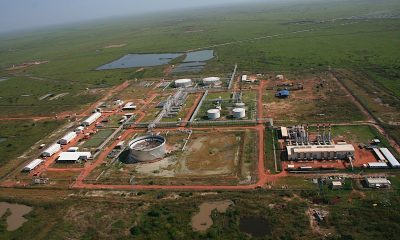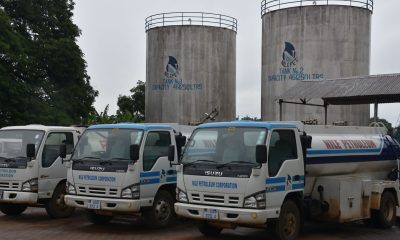Africa
South Sudan: $2.5 Billion Oil Advance Triggers Petroleum Undersecretary and Nilepet MD’s Downfall
For Adut Salva Kiir Mayardit, the purge underscores her expanding influence over the levers of economic and security power.

The abrupt dismissal of Petroleum Undersecretary Eng. Deng Lual Wol and Nilepet Managing Director Ayuel Ngor Kuac on Tuesday evening was precipitated by their involvement in soliciting a staggering $2.5 billion advance payment from international oil companies, Kenya Insights has learned through leaked confidential documents.
Two letters dated October 27 and 31, 2025, obtained by this publication reveal requests for $1 billion each from ONGC Nile Ganga B.V. and China National Petroleum Corporation (CNPCC) against future crude oil entitlements.
The documents, signed by Wol in his capacity as Undersecretary, sought advances to be repaid within 54 calendar months through oil shipments from the Nile Blend and Dar Blend fields operated by PETRONAS and Nile Petroleum Corporation.
The letters represent an extraordinary financial maneuver in a nation where oil revenues have plummeted by up to 70 percent amid Sudan’s ongoing civil war, which has repeatedly disrupted the critical export pipeline to Port Sudan.
South Sudan produces approximately 150,000 barrels per day, down from pre-war peaks of 350,000 barrels, with each disruption costing the cash-starved government millions in lost revenue.
The first letter, addressed to Mr. Wang Gaulin, Country Manager of CNPCC, states: “The Republic of South Sudan Government through the Ministry of Petroleum is requesting an advance payment of USD 1,000,000,000 (Only One Billion United States Dollars) against crude oil entitlements owned by PETRONAS and currently under Nile Petroleum Corporation.”
The correspondence specifies that payback would occur through joint marketing arrangements, with lenders authorized to lift equivalent oil volumes monthly as agreed.
The second letter, directed to Mr. Rengit John, Country Manager of ONGC Nile Ganga B.V., contains identical language and financial terms, bringing the total requested advance to $2 billion.
Both letters conclude with assurances that loan agreements would be finalized within one month of receipt, pending acceptance of the requests.
Sources within the Ministry of Petroleum indicate the advance scheme was conceived as a lifeline for a government facing acute liquidity crises.
Juba has struggled to pay civil servants for months, with bank withdrawal limits capped at 50,000 South Sudanese pounds daily due to foreign currency shortages.
The South Sudanese pound has lost over 40 percent of its value against the dollar in 2025, fueling inflation that has left basic commodities unaffordable for millions.
However, the solicitations appear to have violated protocols within the fragile unity government.
First Vice President Riek Machar’s SPLM-IO faction controls the Petroleum Ministry, and sources suggest the letters were dispatched without full cabinet consultation or approval from Finance Ministry oversight mechanisms established under the 2018 peace accord.
“This was a unilateral move that bypassed key stakeholders,” a senior government official told Kenya Insights on condition of anonymity.
“It exposed the administration to accusations of mortgaging future oil revenues without transparency.”
The timing of the letters, sent just weeks before the purge orchestrated by presidential daughter Adut Salva Kiir Mayardit, suggests they triggered alarm within State House.
Oil revenues constitute over 95 percent of South Sudan’s national budget, and advance payment schemes carry risks of debt entrapment and reduced future fiscal flexibility.
International financial institutions, including the International Monetary Fund, have repeatedly warned Juba against opaque oil-backed loans following previous arrangements with Qatar Petroleum that saddled the nation with unfavorable terms.
Wol, a veteran oil engineer with over 16 years in infrastructure projects, had been positioned as Kuac’s replacement in the initial purge reported by Kenya Insights on November 24.
His involvement in the advance payment scheme, however, appears to have sealed his fate alongside Kuac, whose tenure at Nilepet was already marred by salary strikes, money laundering allegations tied to Kenyan real estate, and operational paralysis.
Neither ONGC Nile Ganga nor CNPCC has publicly commented on the requests.
Both companies hold significant stakes in South Sudan’s oil blocks, with ONGC operating in the Greater Nile Petroleum Operating Company consortium and CNPCC holding interests through PetroDar Operating Company.
Industry analysts note that $2 billion in advances would represent nearly two years of South Sudan’s current oil export earnings, a massive liability that could deter lenders already wary of the nation’s instability.
The dismissals, announced via terse presidential decrees broadcast on state media Tuesday, installed Gen. Santino Deng Wol as the new Petroleum Undersecretary and left the Nilepet Managing Director post vacant pending further appointments.
No mention was made of house arrest, though earlier reports indicated such measures were under consideration for officials accused of financial impropriety.
Opposition figures have seized on the revelations. “This is textbook mismanagement disguised as crisis response,” said Mabior Garang, spokesperson for the SPLM-IO.
“Mortgaging our oil future without parliamentary scrutiny or public debate is a betrayal of South Sudan’s sovereignty.”
Civil society groups, including the Sudd Institute, have called for an independent audit of all oil-backed financing agreements and transparent publication of terms.
For Adut Salva Kiir Mayardit, the purge underscores her expanding influence over the levers of economic and security power.
By excising figures linked to opaque financial schemes, she signals a zero-tolerance posture toward initiatives that could undermine her father’s grip on oil revenues or expose the administration to international scrutiny.
Whether this represents genuine reform or consolidation of dynastic control remains a subject of fierce debate in Juba’s corridors of power.
As South Sudan lurches toward delayed 2026 elections, the leaked letters illuminate the desperation gripping a government hemorrhaging legitimacy and cash.
The $2.5 billion gambit, now exposed, may have cost two senior officials their careers. The question haunting Juba is whether it also cost the nation its financial future.
Kenya Insights continues to investigate oil sector dealings in South Sudan. Documents or tips can be sent to us through our confidential contacts.
Kenya Insights allows guest blogging, if you want to be published on Kenya’s most authoritative and accurate blog, have an expose, news TIPS, story angles, human interest stories, drop us an email on [email protected] or via Telegram
-

 Grapevine6 days ago
Grapevine6 days agoAlleged Male Lover Claims His Life Is in Danger, Leaks Screenshots and Private Videos Linking SportPesa CEO Ronald Karauri
-

 Lifestyle1 week ago
Lifestyle1 week agoThe General’s Fall: From Barracks To Bankruptcy As Illness Ravages Karangi’s Memory And Empire
-

 Grapevine2 days ago
Grapevine2 days agoRussian Man’s Secret Sex Recordings Ignite Fury as Questions Mount Over Consent and Easy Pick-Ups in Nairobi
-

 Investigations2 weeks ago
Investigations2 weeks agoEpstein Files: Sultan bin Sulayem Bragged on His Closeness to President Uhuru Then His Firm DP World Controversially Won Port Construction in Kenya, Tanzania
-

 News2 weeks ago
News2 weeks agoAUDIT EXPOSES INEQUALITY IN STAREHE SCHOOLS: PARENTS BLED DRY AS FEES HIT Sh300,000 AGAINST Sh67,244 CAP
-

 Business2 weeks ago
Business2 weeks agoKRA Can Now Tax Unexplained Bank Deposits
-

 Investigations1 week ago
Investigations1 week agoEpstein’s Girlfriend Ghislaine Maxwell Frequently Visited Kenya As Files Reveal Local Secret Links With The Underage Sex Trafficking Ring
-

 News1 week ago
News1 week agoState Agency Exposes Five Top Names Linked To Poor Building Approvals In Nairobi, Recommends Dismissal After City Hall Probe



















